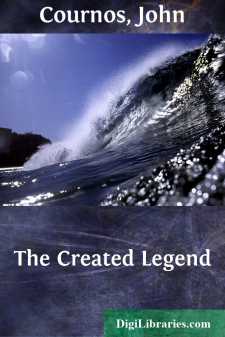Categories
- Antiques & Collectibles 13
- Architecture 36
- Art 48
- Bibles 22
- Biography & Autobiography 813
- Body, Mind & Spirit 142
- Business & Economics 28
- Children's Books 14
- Children's Fiction 11
- Computers 4
- Cooking 94
- Crafts & Hobbies 4
- Drama 346
- Education 46
- Family & Relationships 57
- Fiction 11828
- Games 19
- Gardening 17
- Health & Fitness 34
- History 1377
- House & Home 1
- Humor 147
- Juvenile Fiction 1873
- Juvenile Nonfiction 202
- Language Arts & Disciplines 88
- Law 16
- Literary Collections 686
- Literary Criticism 179
- Mathematics 13
- Medical 41
- Music 40
- Nature 179
- Non-Classifiable 1768
- Performing Arts 7
- Periodicals 1453
- Philosophy 64
- Photography 2
- Poetry 896
- Political Science 203
- Psychology 42
- Reference 154
- Religion 513
- Science 126
- Self-Help 84
- Social Science 81
- Sports & Recreation 34
- Study Aids 3
- Technology & Engineering 59
- Transportation 23
- Travel 463
- True Crime 29
The Created Legend
by: John Cournos
Description:
Excerpt
INTRODUCTION
"For there is nothing either good or bad but thinking makes it so." SHAKESPEARE
"To the impure all things are impure." NIETZSCHE
In "The Little Demon" Sologub has shown us how the evil within us peering out through our imagination makes all the world seem evil to us. In "The Created Legend," feeling perhaps the need of reacting from his morose creation Peredonov, the author has set himself the task of showing the reverse of the picture: how the imagination, no longer warped, but sensitized with beauty, is capable of creating a world of its own, legendary yet none the less real for the legend.
The Russian title of the book is more descriptive of the author's intentions than an English translation will permit it to be. "Tvorimaya Legenda" actually means "The legend in the course of creation." The legend that Sologub has in mind is the active, eternally changing process of life, orderly and structural in spite of the external confusion. The author makes an effort to bring order out of apparent chaos by stripping life of its complex modern detail and reducing it to a few significant symbols, as in a rather more subtle "morality play." The modern novel is perhaps over-psychologized; eternal truths and eternal passions are perhaps too often lost sight of under the mass of unnecessary naturalistic detail.
In this novel life passes by the author as a kind of dream, a dream within that nightmare Reality, a legend within that amorphousness called Life. And the nightmare and the dream, like a sensitive individual's ideas of the world as it is and as it ought to be, alternate here like moods. The author has expressed this changeableness of mood curiously by alternating a crudely realistic, deliberately naïve, sometimes journalese style with an extremely decorative, lyrical manner—this taxing the translator to the utmost in view of the urgency to translate the mood as well as the ideas.
As a background we have "the abortive revolution of 1905." This novel is an emotional statement of those "nightmarish" days. Against this rather hazy, tempestuous background we have the sharply outlined portrait of an individual, a poet, containing a world within himself, a more radiant and orderly world than the one which his eyes look upon outwardly. It is this "inner vision" which permits him to see the legend in the outer chaos, and we read in this book of his efforts to disentangle the thread of this legend by the establishment of a kind of Hellenic Utopia.
_It is not alone the poet who is capable of creating his legend, but any one who refuses to be subject to the whims of fate and to serve the goddess of chance and chaos, "the prodigal scatterer of episodes" (Aisa). The tragic thing about this philosophy, as one Russian critic points out, is that even the definite settling of the question does not assure one complete consolation, for, like Ivan Karamazov in Dostoyevsky's "Brothers Karamazov," one may say: "I do not accept God, I do not accept the world created by Him, God's world; I simply return Him the ticket most respectfully." Still it is with some such definite decision that he enters the kingdom of Ananke, the goddess of Necessity....


